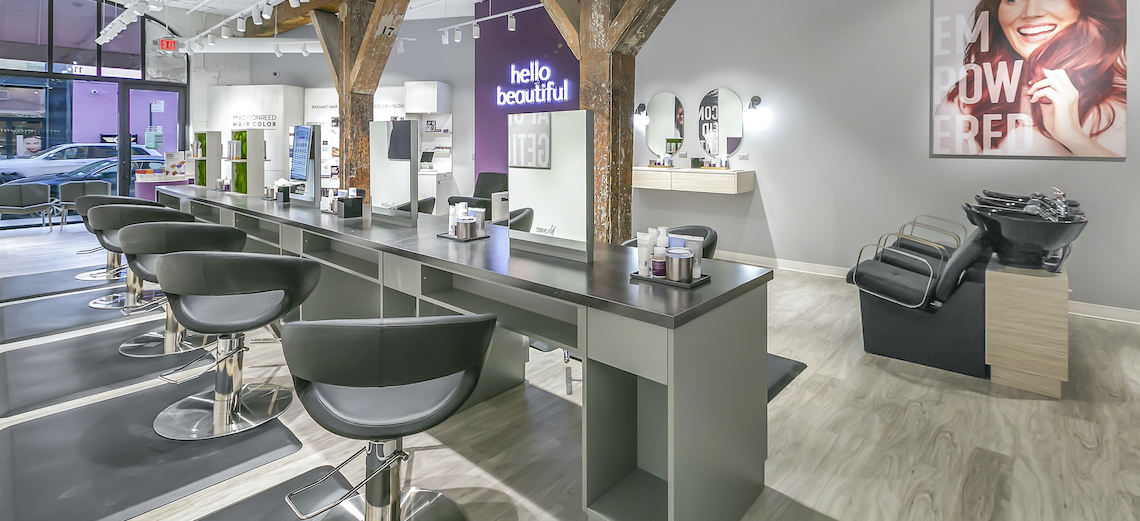Prestige hair-color brand Madison Reed has raised $33 million in its new funding round, announced on Thursday.
The financing round was led by Sandbridge Capital with participation from Marcy Venture Partners. Madison Reed plans to expand its number of brick-and-mortar locations and retail distribution, as well as introduce new products. It has now raised over $250 million with its disruptive sales model combining salon-style hair color bars with e-commerce.
Known for its omnichannel strategy that allows customers to receive in-person professional dying sessions or order their color online, the brand is expanding the footprint of its signature hair-color bars. With over 60 bars currently in operation across U.S. cities, Madison Reed will add 20 new locations by the end of 2022. The brand will also hire 850 new hair colorists. Up from 12 stores in March 2020, the brand has rapidly expanded its store presence throughout the pandemic, investing in hair-color bars even as boxed dye was flying off store shelves amid salon closures.
The brick-and-mortar side of the business “is doing incredibly well. We’re building out regions,” said Amy Errett, founder and CEO of Madison Reed. Target areas for expansion are New York City, South Florida, California, Chicago, Washington D.C. and Texas.
The brand also offers online tools including quizzes and virtual video consultations to help choose shoppers from 60 hair-dye colors. Customers range from online-only shoppers to exclusively in-person clients, with many in between. Currently, around 15% of customers use video consultations, and close to 50% of those shoppers end up making a purchase.
The brand was founded to fill a gap in the industry between mass-market box dye and expensive salon sessions while creating a model that allows for convenient routine maintenance.
“We have figured out how to disrupt the terrible box on the shelf,” said Errett.
Ad position: web_incontent_pos1
“We have many, many customers that do both” the IRL services and the box dye, she said. “They go to the hair-color bar, they have their hair colored by us and then they may take a box home.” Madison Reed also has over 15,000 subscribers in its roots touchup membership, which allows customers to get unlimited roots colorings for a set fee. Clients often go in about every four weeks.
While the brand does not disclose exact percentages of e-commerce versus in-person shoppers, Errett said the numbers are “not dramatically different” from industry statistics as a whole. According to her, 48% of women in the U.S. go to a salon and 52% do at-home color.
For wholesale, Madison Reed is currently the most popular hair-dye brand at Ulta Beauty in-store and online, and will enter approximately 160 Ulta Beauty shops in Target locations across the country by this summer.
The brand is also making executive hires. In March, it brought on Dollar Shave Club alum Jose Zuniga as its new CFO. He will be overseeing the omnichannel expansion, and Errett emphasized his familiarity with the subscription model.
Errett said that investors’ interest in the hair-dye space has come a long way since the brand was launched in 2014. When she was initially raising funds, the male-dominated venture capital industry was less aware of the size of the market and the logistical challenges women face keeping up with routine dying sessions.
Ad position: web_incontent_pos2
“So many people told me initially — mostly guys, by the way — ‘The total addressable market isn’t big enough,’” she said. “And I’m like, ‘Have you checked your Visa bill?'”
According to a statement by Ken Suslow, Sandbridge Capital founder and managing partner, “Madison Reed’s innovative omnichannel approach maximizes convenience while delivering a compellingly modern consumer experience across the board.”
Sandbridge Capital has seen several portfolio beauty brands recently achieve exits. The firm also invested in Youth to the People, which was acquired by L’Oréal in December 2021, and Ilia, which was acquired by the Courtin-Clarins family in February 2022.
As far as an exit strategy in the future, Errett said she’s still open to all options, including going public one day “if it makes sense” economically. “I don’t have a master plan that, by a certain date, ‘X’ is going to happen,” she said.




